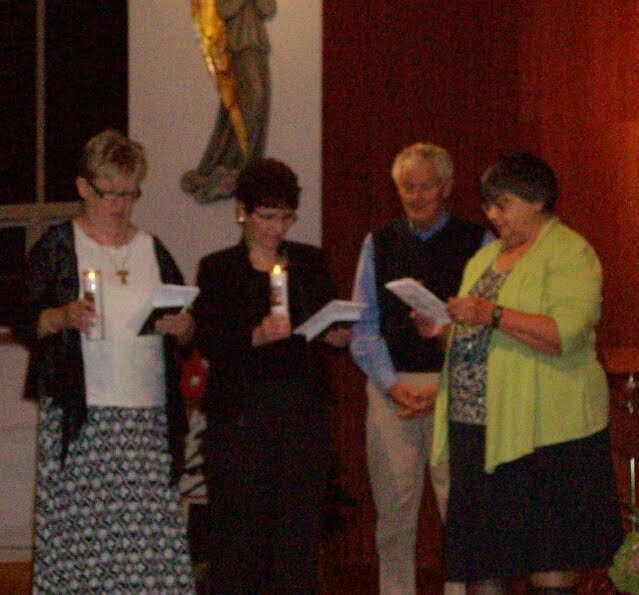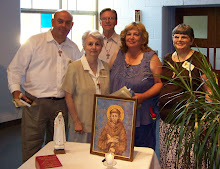
Saturday, February 26, 2011
Tuesday, February 22, 2011
Our Fraternity's Mission Statement
Mission Statement of the Glory of Most High Secular Franciscan Fraternity
The Glory of the Most High Secular Franciscan Fraternity (canonically established as the Glory of Yahweh Secular Franciscan Fraternity) is a canonically established branch of the 800 year old order founded by Saint Francis of Assisi that exists to help its members live the Gospel life and so be equipped to rebuild the Church as our father St. Francis was called to do by Jesus Himself.
We begin this work of faith with OURSELVES. By experiencing ongoing formation through prayer and study in fraternity, the Holy Spirit guides our salvation and sanctification in keeping with:
the Gospel of Jesus Christ,
the Magisterium of the Roman Catholic Church,
and Franciscan Spirituality.
In this way, as we grow in Christian holiness, by the grace of God, we are enabled, more and more, to minister to the LORD Himself by:
acts of worship,
lives of reparation,
and obedience to His will.
We are also enabled to minister to EACH OTHER with growing affection and with the Spirit-filled gifts that are being given to each of us for the sake of the Fraternity.
In this way we are also enabled to reach out to the WORLD as Jesus commanded in the Great Commission:
By providing a Franciscan presence so that others who are similarly called may hear that call and have a fraternity to join in order to fulfill it.
By witnessing in each of our lives and words to the fullness of truth in our various vocations and apostolates, and by supporting each other as needed in these ministries.
By joining together from time to time in apostolates that, by the guidance of the Holy Spirit, we are called to as a Fraternity.
Pax et bonum
The Glory of the Most High Secular Franciscan Fraternity (canonically established as the Glory of Yahweh Secular Franciscan Fraternity) is a canonically established branch of the 800 year old order founded by Saint Francis of Assisi that exists to help its members live the Gospel life and so be equipped to rebuild the Church as our father St. Francis was called to do by Jesus Himself.
We begin this work of faith with OURSELVES. By experiencing ongoing formation through prayer and study in fraternity, the Holy Spirit guides our salvation and sanctification in keeping with:
the Gospel of Jesus Christ,
the Magisterium of the Roman Catholic Church,
and Franciscan Spirituality.
In this way, as we grow in Christian holiness, by the grace of God, we are enabled, more and more, to minister to the LORD Himself by:
acts of worship,
lives of reparation,
and obedience to His will.
We are also enabled to minister to EACH OTHER with growing affection and with the Spirit-filled gifts that are being given to each of us for the sake of the Fraternity.
In this way we are also enabled to reach out to the WORLD as Jesus commanded in the Great Commission:
By providing a Franciscan presence so that others who are similarly called may hear that call and have a fraternity to join in order to fulfill it.
By witnessing in each of our lives and words to the fullness of truth in our various vocations and apostolates, and by supporting each other as needed in these ministries.
By joining together from time to time in apostolates that, by the guidance of the Holy Spirit, we are called to as a Fraternity.
Pax et bonum
Saturday, February 19, 2011
February 19 - Feast of St. Conrad
Conrad was born at Piacenza, Lombardy, in the year 1290, of a very noble family, and while still quite young, he married Euphrosyne, the daughter of a nobleman of Lodi. He had a great fondness for chivalrous sports and was an eager hunter.
One time when out hunting, his quarry hid itself in dense underbrush. To force it into the open, Conrad directed his attendants to set fire to the brushwood. The wind, however, drove the flames upon a nearby grain field, where it continued to spread, destroying the entire crop and a large forest besides. The governor of Piacenza at once sent out armed men to apprehend the incendiary.
Filled with consternation at the unfortunate turn of the conflagration, Conrad meanwhile fled into the city along certain lonely roads. The posse, however, came upon a poor peasant who had gathered a bundle of charred sticks and was carrying them into the city. Believing him to be the guilty person, the men seized him. He was tortured on the rack until they wrung from the poor man a statement that he had set fire to the woods out of sheer spite. He was condemned to death.
Not until the unfortunate victim was passing Conrad's house on the way to execution, did Conrad learn why the sentence of death had been imposed on the peasant. Driven by his conscience, Conrad rushed out, saved the man from the hands of the bailiffs, and before all the people acknowledged that he was the guilty person. He went to the governor and explained that the conflagration was the result of a mishap; that he was willing to repair all the damage done. His wife joined him in his good will and sacrificed her dowry to assist in making restitution.
The incident taught Conrad the vanity of the goods of this world, and he resolved to give his attention only to eternal goods. He communicated his sentiments to his wife, and found that she entertained the same ideas. She went to the convent of Poor Clares and received the veil there, while Conrad, who was only 25 years old, left his native town and joined a group of hermits of the Third Order.
In a very short time he made such progress in virtue that the fame of his sanctity attracted many of his former friends and acquaintances to his hermitage. But it was Conrad's wish to forsake the world completely; so he slipped away to Rome, and from there went to Sicily, to the Noto valley, near Syracuse, where he hoped he could remain unknown and in utter seclusion. He lived there for 36 years, the last of which he spent in a lonely cave on a height since named Mount Conrad.
There Conrad lived an extremely penitential life, sleeping on the bare earth and taking only bread and water with some wild herbs for nourishment. Nevertheless, he was subjected to some of the most terrible assaults of the devil. But by means of prayer so pleasing to God that he was granted the gifts of prophesy and miracles.
When Conrad perceived that his end was drawing near, he went to Syracuse to make a general confession of his life to the bishop. On the way flocks of birds flew about him and perched on his shoulders as they used to do to St. Francis, and on the way back to his solitude they accompanied him again, to the astonishment of all whom he met. On the very same day he was seized with a fever, which resulted in his death a few days later. He was kneeling before an image of the Crucified when he peacefully passed away on February 19, 1351. In accordance with his wishes he was buried in the church of St. Nicholas at Noto, where his remains still repose in a silver shrine. Many miracles have taken place there. In the year 1515 Pope Leo X permitted his feast be celebrated at Noto. Urban VIII canonized him in 1625.
- From the Five Franciscan Martyrs Region of the Secular Franciscan Order
Pax et bonum
One time when out hunting, his quarry hid itself in dense underbrush. To force it into the open, Conrad directed his attendants to set fire to the brushwood. The wind, however, drove the flames upon a nearby grain field, where it continued to spread, destroying the entire crop and a large forest besides. The governor of Piacenza at once sent out armed men to apprehend the incendiary.
Filled with consternation at the unfortunate turn of the conflagration, Conrad meanwhile fled into the city along certain lonely roads. The posse, however, came upon a poor peasant who had gathered a bundle of charred sticks and was carrying them into the city. Believing him to be the guilty person, the men seized him. He was tortured on the rack until they wrung from the poor man a statement that he had set fire to the woods out of sheer spite. He was condemned to death.
Not until the unfortunate victim was passing Conrad's house on the way to execution, did Conrad learn why the sentence of death had been imposed on the peasant. Driven by his conscience, Conrad rushed out, saved the man from the hands of the bailiffs, and before all the people acknowledged that he was the guilty person. He went to the governor and explained that the conflagration was the result of a mishap; that he was willing to repair all the damage done. His wife joined him in his good will and sacrificed her dowry to assist in making restitution.
The incident taught Conrad the vanity of the goods of this world, and he resolved to give his attention only to eternal goods. He communicated his sentiments to his wife, and found that she entertained the same ideas. She went to the convent of Poor Clares and received the veil there, while Conrad, who was only 25 years old, left his native town and joined a group of hermits of the Third Order.
In a very short time he made such progress in virtue that the fame of his sanctity attracted many of his former friends and acquaintances to his hermitage. But it was Conrad's wish to forsake the world completely; so he slipped away to Rome, and from there went to Sicily, to the Noto valley, near Syracuse, where he hoped he could remain unknown and in utter seclusion. He lived there for 36 years, the last of which he spent in a lonely cave on a height since named Mount Conrad.
There Conrad lived an extremely penitential life, sleeping on the bare earth and taking only bread and water with some wild herbs for nourishment. Nevertheless, he was subjected to some of the most terrible assaults of the devil. But by means of prayer so pleasing to God that he was granted the gifts of prophesy and miracles.
When Conrad perceived that his end was drawing near, he went to Syracuse to make a general confession of his life to the bishop. On the way flocks of birds flew about him and perched on his shoulders as they used to do to St. Francis, and on the way back to his solitude they accompanied him again, to the astonishment of all whom he met. On the very same day he was seized with a fever, which resulted in his death a few days later. He was kneeling before an image of the Crucified when he peacefully passed away on February 19, 1351. In accordance with his wishes he was buried in the church of St. Nicholas at Noto, where his remains still repose in a silver shrine. Many miracles have taken place there. In the year 1515 Pope Leo X permitted his feast be celebrated at Noto. Urban VIII canonized him in 1625.
- From the Five Franciscan Martyrs Region of the Secular Franciscan Order
Pax et bonum
Retreat Day
Next Saturday, we have a day-long retreat day beginning with a Mass celebrated by Father Tony. It will be held out at St. Leo's in Hilton. The day takes the place of our regular meeting.
Pax et bonum
Pax et bonum
Subscribe to:
Posts (Atom)






